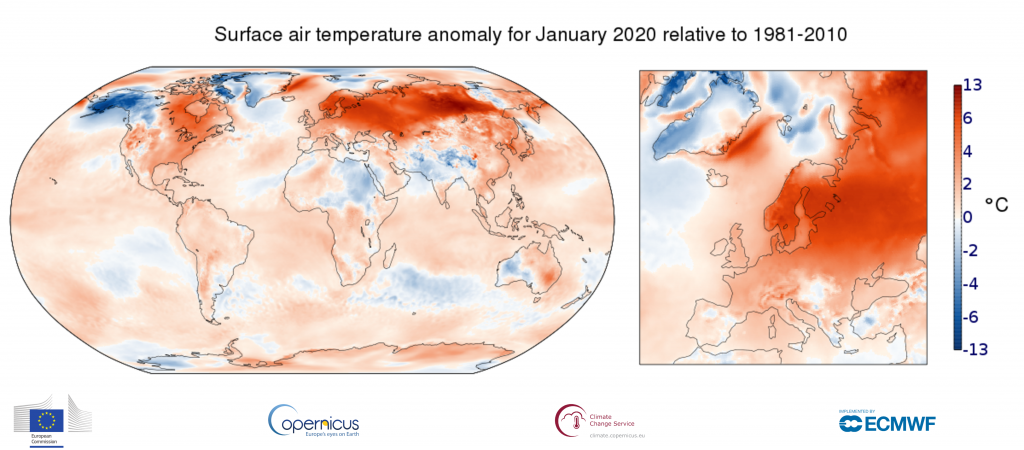Heat Records Broken Again…

As depicted above, it was just reported that last month – January 2020 – was the warmest ever, compared to the average of the prior three decades. (For Americans, the thirteen degree Celsius maximum shown equals twenty three degrees Fahrenheit above average.) We are seeing so many records broken, everything from high temperatures, to droughts, wildfires and deluge rains that we can become numb to them.
Nonetheless, one record breaking temperature last week stood out. Antarctica recorded a temperature of 65 degrees Fahrenheit (18 degrees Celsius) an all time record. Of course it is their summer and warm temperatures will happen. But that is well above usual. It was a surprise and another indication that our models have a tendency to be conservative and low. Several of my science colleagues forwarded the news, with a single word comment, “Wow.”
This reinforces my post last week about more evidence that Thwaites Glacier posed a growing threat to global sea level rise.
With so many troubling items coming at us, it is challenging at times to keep our eye on a path forward. At the risk of oversimplification, I always recommend three related but distinct issues to keep in mind:
- We must try to slow and eventually halt the level of carbon dioxide (CO2) in the atmosphere, which is indisputably associated with warming. Individual efforts to reduce our “carbon footprint” are worthy, but more important, we must be clear to elected leaders, that policies must be put in place to help us transition off of fossil fuels ASAP. Sustainability is a term often applied to renewable energy.
- Seeing the clear pattern of record temperature, rainfall, drought, and wildfires, we must make our communities and homes as resilient as possible. That is quite separate from reducing greenhouse gas emissions.
- Sea level rise is a special effect of a warming planet since a considerable amount is now “locked-in” and the physics are as simple as ice melting as temperatures warm. To deal with unstoppable and accelerating sea level rise, which will tend to move all coastlines inland, we need to begin planning adaptation. This is quite separate from the sustainability and resiliency issues.
Although all three are distinct, they do reinforce each other. Rising sea level should not only push us to adapt to the new era of higher sea level, it should push us to be more resilient to the various short-duration flood events, and to push for policies that slow and eventually reverse the warming, making the world more sustainable.
While we’re working on these three issues, don’t be surprised if we break more records.
